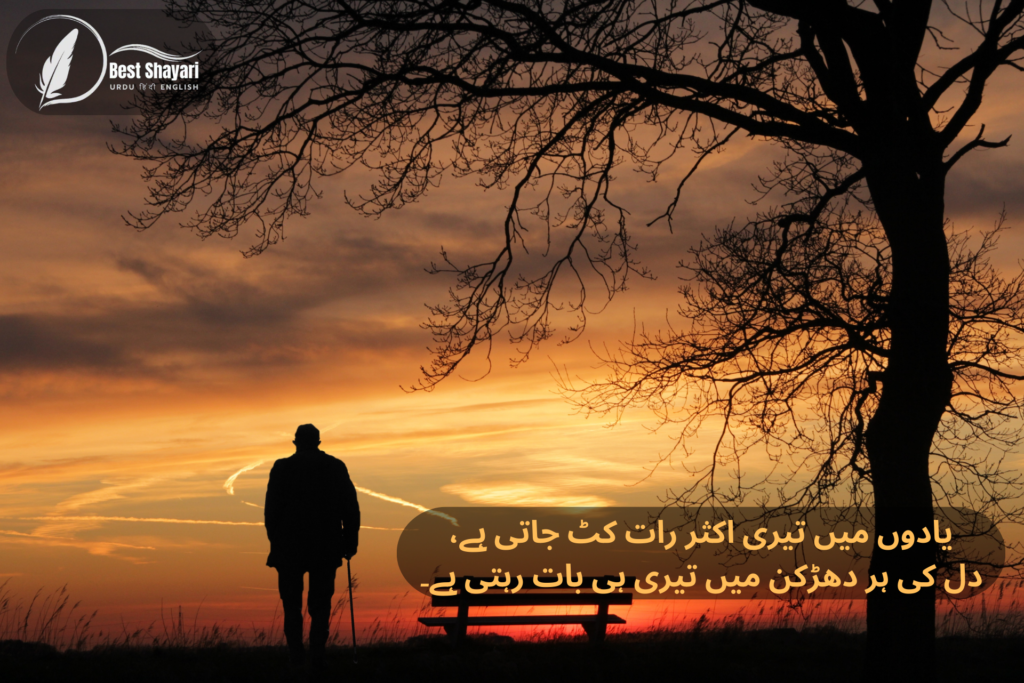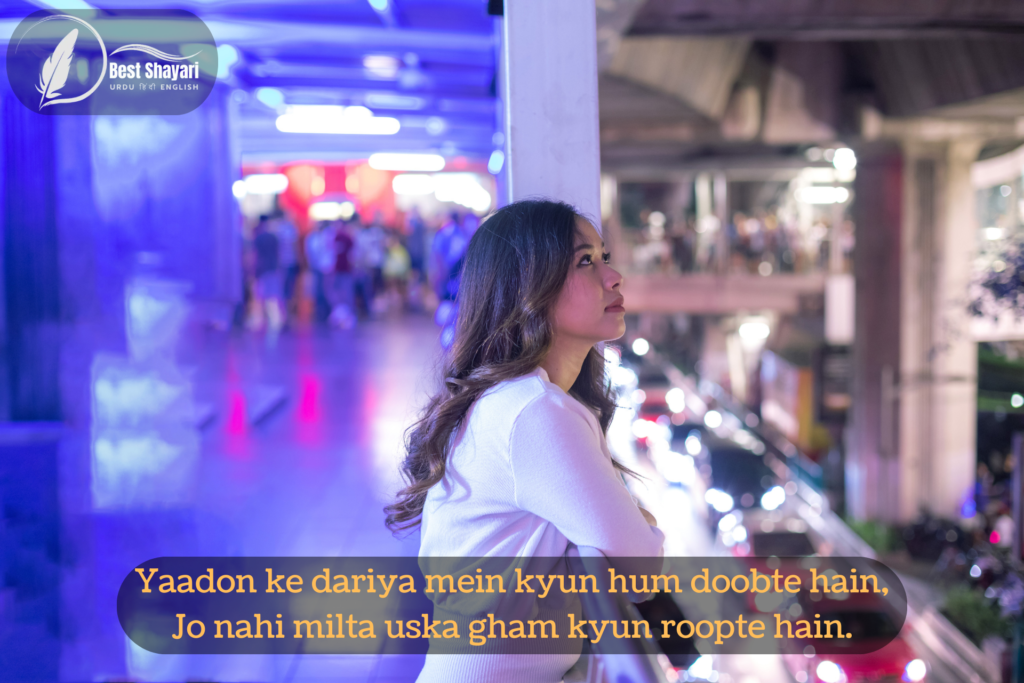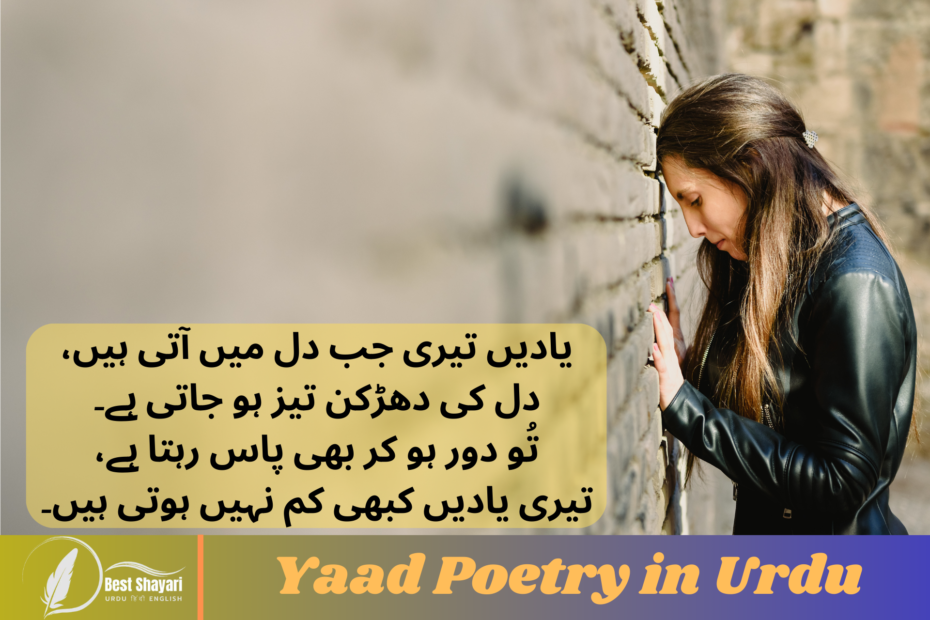Yaad poetry, deeply rooted in Urdu literature, serves as an intimate reflection on memories that linger in our hearts. Be it a moment of joy, sorrow, love, or loss, Urdu poets have beautifully encapsulated the nostalgia of the past, reminding readers of cherished moments and lost bonds. This form of poetry goes beyond simple recollection; it delves into the emotional complexity of longing, weaving a tapestry of heartfelt words.
The Significance of ‘Yaad’ in Urdu Poetry
In the realm of Urdu literature, ‘yaad’ (memory or remembrance) is a central theme that captures human vulnerability and the pain of separation. When memories resurface, they bring a wave of emotions, both soothing and haunting. The poets of Urdu have mastered the art of expressing the inexplicable—how a distant memory can transport one to another time, or how the mere recollection of a name can evoke a flood of tears. This significance of yaad is found across genres, from ghazals to nazms, uniting hearts across cultures.
The Essence of Longing in Yaad Poetry
Longing is at the core of yaad poetry. It often portrays the desire to relive moments that cannot return or to be reunited with someone who is forever gone. These verses capture the struggle between holding on and letting go. Consider this evocative couplet:
“Tere yaadon se juda ho na sake hum aaj tak,
Waqt ke saaye ne bhi khona na diya teri yaad.”
Such lines reflect how memories can become an inseparable part of a person’s soul, despite the passage of time. The poets often turn to metaphors, drawing on nature, seasons, and objects to illustrate their yearning. This blending of imagery with emotion enriches the reader’s experience, making yaad poetry unforgettable.

Here Is A Some Lines For Yaad Poetry In Urdu;
یادوں کا شہر بسا رکھا ہے دل میں میں نے،
محبت کا ہر لمحہ سنبھال رکھا ہے میں نے۔
تیری یادوں کا سلسلہ، ایسے ختم نہ ہو،
یہ وہ درد ہے جو دل کے ساتھ ہی چلے۔
جب بھی تنہائی کی راتوں میں ستاتے ہو،
یاد بن کر خوابوں میں تم ہی آ جاتے ہو۔
تیری یاد میں بیٹھے ہم چاند کو تکیں،
بے وجہ ان آنکھوں میں نمی سی ہے۔
کہنے کو سبھی خوش ہیں مگر،
ہم تو تیری یادوں میں گم رہتے ہیں۔
یادوں کے چراغ جلتے رہیں گے یوں ہی،
تُو چاہے بھلا دے مگر میں تو نہیں۔
یادیں بھی عجیب کھیل کھیلتی ہیں،
ہنسا کر آنکھوں میں نمی چھوڑتی ہیں۔
جو لمحے تیرے ساتھ گزرے تھے کبھی،
وہ لمحے آج تک دل میں بستے ہیں۔
یادوں کا طوفان دل میں رہتا ہے،
میری ہر سانس میں تیرا ذکر ہوتا ہے۔
تجھ سے بچھڑ کے بھی ہم کہیں کھوئے نہیں،
تیری یادوں کا سہارا لے کر چلتے رہے۔
تیرے بغیر ہر لمحہ ادھورا لگتا ہے،
یادوں میں تیری دل کو سکون ملتا ہے۔
کتنی یادیں جلا کر میں نے دل کو بہلایا،
پر ہر راکھ میں تیرا نام ہی پایا۔
یاد کی دیواروں پر تُو نے بسرا کیا،
یہ دل آج بھی تیری یاد میں بسیرا کرتا ہے۔
تیری یاد میں بکھرتے ہیں، سنورتے ہیں،
یہ دل ہر لمحہ تجھے یاد کرتا ہے۔
یادیں تیری آنکھوں میں نمی لے آئیں،
دل کو سنبھالنا مشکل ہے جب یادیں چھائیں۔
تجھ سے ملنے کی آس اب بھی باقی ہے،
یادیں تیری دل میں اب بھی بسی ہیں۔
کتنے دن گزر گئے تیری یادوں میں،
پر دل کو چین نہیں آیا ان راتوں میں۔
تمہاری یاد میں آنکھیں یوں ہی برسیں گی،
یہ دل تیرے بغیر کبھی مسکرا نہ سکے۔
یادوں کا سلسلہ باندھ کر بیٹھے ہیں،
تیری خوشبو دل میں سمائے بیٹھے ہیں۔
آنسو بن کر تیری یاد بہتی ہے،
یہ دل پھر بھی تجھے چاہتا ہے۔
یادوں کا جنون، دل کو بار بار ستاتا ہے،
تُو نہیں مگر تیری یاد دل کو خوشبو دیتی ہے۔
یادیں تمہاری، راتوں کو جاگنے کا سبب،
چاندنی رات میں تیری خوشبو کی طلب۔
تجھ سے دور ہو کر بھی دل کبھی دور نہ ہوا،
تیری یادوں نے ہمیشہ پاس باندھ رکھا۔
دل کو سکون تیری یادوں میں ملتا ہے،
پر یہ سکون بھی کتنا بےچین کر دیتا ہے۔
یادیں ایسی کہ رات بھر سوتے نہیں،
یہ آنکھیں تمہیں دیکھے بغیر روتے نہیں۔
تجھ سے بچھڑ کر دل ٹوٹا نہیں،
تیری یادوں نے اسے کبھی چھوٹا نہیں۔
یادیں تیرے ساتھ کی، ہمیشہ رہیں گی،
یہ دل تجھے یاد کر کر کے جیتا رہے گا۔
خوابوں میں آ کر بسا ہوا تُو،
یادوں میں ہمیشہ سانس لیتا ہے۔
تیری یادوں کا سمندر ہے دل میں،
جس میں ڈوب کر اب خود کو پاتا ہوں۔
تُو یاد آئے تو آنکھوں میں نمی رہتی ہے،
تیری خوشبو سے راتوں میں خوشبو بسی رہتی ہے۔
تیری یاد کا دامن چھوٹے کبھی نہ،
یہ دل ہمیشہ تجھے پاس سمجھے۔
دل میں تیری یادوں کی کلیاں کھلتی ہیں،
ہر لمحہ محبت کا چراغ جلتا ہے۔
تیری یاد کا قصہ سب کو سناتے ہیں،
پر دل کا حال کوئی نہ سمجھ پاتا۔
یادیں تیری ہر پل دل میں بساتی ہیں،
یہ تنہائی بھی تیرے نام سے مہکتی ہے۔
تمہاری یادوں نے میرا ہر لمحہ چوری کیا،
پھر بھی دل کو تم سے شکایت نہ ہوئی۔
تیرے ساتھ گزرے لمحے ہمیشہ ساتھ ہیں،
یادیں وہ ہیں جن کے بغیر کوئی بات نہیں۔
یادوں میں بسی راتیں، چاندنی کے ساتھ،
تُو ہے تو دل کا ہر زخم مسکراتا ہے۔
تیری یادیں سب کچھ بھلا دیتی ہیں،
پر دل کو سکون کہاں سے ملتا ہے۔
یادوں کا سہارا لے کر جیتے ہیں،
پر تیری کمی کا احساس کبھی مرتا نہیں۔
تیرے بغیر دل بےچین، راتیں لمبی،
پر یادوں نے ہمیشہ دل کو پگھلایا۔
دل میں تیری یادوں نے جگہ بنا لی،
پر تُو کہاں، یہ سوال دل میں اب بھی ہے۔
یادیں تیری بھیگتی بارش کی طرح،
دل کو سکون اور بےچینی دونوں دیتی ہیں۔
تیرے بغیر ہر لمحہ ویران ہے،
یادیں تیری دل کے ہر کونے میں مقیم ہیں۔
یادوں میں تیری اکثر رات کٹ جاتی ہے،
دل کی ہر دھڑکن میں تیری ہی بات رہتی ہے۔
تمہاری یادیں دل کو سکون دیتی ہیں،
بے چین لمحوں کو قرار دیتی ہیں۔
تیری یاد کے سہارے جیتے ہیں،
ورنہ زندگی میں اور کچھ باقی نہیں۔
یادوں کا سلسلہ کبھی ختم نہیں ہوتا،
دل کے کونے میں یہ ہمیشہ بستا ہے۔
تیرے بغیر تنہا دل نہ جیت پاتا،
تیری یادیں ہر پل ساتھ نبھاتی ہیں۔
جب بھی یادیں تیری آنکھوں میں آتی ہیں،
پھر یہ آنکھیں نمی سے بھر جاتی ہیں۔
تُو یاد آتا ہے تو دل بھیگ جاتا ہے،
ہر لمحہ تیری یاد کا سایہ رہتا ہے۔
یادوں میں تیری کھویا ہوا ہوں،
زندگی کے ہر لمحے میں رویا ہوا ہوں۔
یادوں کا بوجھ دل سے ہلکا نہیں ہوتا،
چاہ کر بھی دل اس سے الگ نہیں ہوتا۔
تیری یادیں دل میں چھپی ہوئی ہیں،
یہ سانسیں ان سے بندھی ہوئی ہیں۔
رات کی تنہائی میں تُو یاد آتا ہے،
آنکھوں سے اشکوں کا دریا بہا جاتا ہے۔
یادیں دل کو بیقرار کرتی ہیں،
تیرے بغیر زندگی تھم سی جاتی ہے۔
تیرے بغیر جینے کا کوئی راستہ نہیں،
یادوں کے سہارے دل کو سنبھالے بیٹھا ہوں۔
یادوں کا طوفان دل میں اٹھتا ہے،
تُو نہیں تو دل ہمیشہ روتا ہے۔
تُو یاد آتا ہے تو دل سکون پاتا ہے،
ورنہ ہر لمحہ بےچین ہو جاتا ہے۔
تیری یاد کا سایہ ہر پل ساتھ رہتا ہے،
یہ دل کبھی تجھے بھول نہ پاتا ہے۔
تمہاری یادوں کے چراغ جلتے رہتے ہیں،
یہ دل کبھی اندھیرے میں نہیں رہتا۔
یادوں کا سفر طویل ہوتا ہے،
دل کبھی تھکتا نہیں، بس چلتا ہے۔
تیرے ساتھ بیتے لمحے سنہری ہیں،
یادوں میں بس کر بھی یہ دل اکیلا ہے۔
یادیں تیرا چہرہ ہر جگہ دکھاتی ہیں،
ہر لمحہ تُو میرے دل میں بسی ہے۔
تیری یادوں میں دل ڈوبتا ہے،
آنسوؤں کا سمندر امڈتا ہے۔
جب بھی یادوں میں تُو آتا ہے،
دل کا ہر زخم بھرنے لگتا ہے۔
یادیں دل کو زخمی کرتی ہیں،
تیرے بغیر زندگی کتنی خاموش ہے۔
یادوں میں تجھے سینے سے لگا لیتا ہوں،
یہی طریقہ دل کو بہلانے کا ہے۔
تیرے ساتھ گزرے لمحے یاد آتے ہیں،
تنہائی میں آنکھیں بھر آتی ہیں۔
یادیں تیری آنکھوں میں نمی سی لاتی ہیں،
دل کی گلیوں میں خاموشی بکھرتی ہے۔
تیرے بغیر دل کا سکون چھن گیا،
یادوں نے ہی اسے تھام رکھا ہے۔
یادوں میں تُو ہمیشہ مسکراتا ہے،
میری ہر دعا میں تُو شامل رہتا ہے۔
تیرے بغیر لمحے سستے نہیں،
یادوں میں ہی بس دل کو سکون ملتا ہے۔
جب بھی دل کو تُو یاد آتا ہے،
ہر غم جیسے دور چلا جاتا ہے۔
یادوں کے دریچے ہمیشہ کھلے رہتے ہیں،
یہ دل تجھے بھلانا نہیں جانتا۔
تیری یادیں دل کو مہکاتی ہیں،
ہر لمحہ تُو دل میں دھڑکتا ہے۔
یادوں کے خزانے دل میں چھپائے ہیں،
تیری ہر بات کو سینے میں سجائے ہیں۔
یادیں تُو چھوڑ گیا، دل سنبھال نہ پایا،
تیرے بغیر ہر لمحہ اک عذاب ہے۔
تیری یادوں کا اثر دل پہ چھایا ہوا ہے،
ہر پل تُو میری روح میں بسا ہوا ہے۔
یادیں دل کو سکون دے کر رلاتی ہیں،
تُو نہیں، مگر یادیں ہمیشہ پاس ہیں۔
تیری یادوں کا سہارا ہے اس دل کو،
تُو نہیں، مگر یہ دل تجھ سے وابستہ ہے۔
یادوں میں تُو ہر پل بس رہتا ہے،
تیرے بغیر یہ دل کبھی نہیں سوتا۔
یادوں کا بوجھ کبھی ہلکا نہیں ہوتا،
یہ دل بس تجھ میں سمٹا ہوا ہے۔
یادوں کا شور دل میں سمایا رہتا ہے،
تُو نہیں، پر تیرا عکس ہر جگہ پایا جاتا ہے۔
تیری یادیں خوابوں میں آ کر جگاتی ہیں،
رات کو سوئیں بھی تو پلکیں نم ہو جاتی ہیں۔
یادوں کا بوجھ اٹھائے جی رہے ہیں،
ہر لمحہ بس تیری راہ دیکھ رہے ہیں۔
تُو نہ سہی، مگر تیری یادوں کا بسیرا،
دل کو ہمیشہ جینے کی وجہ دے رہا۔

See Also Romantic Urdu Shayari for Husband
Classical Masters of Yaad Poetry
Some of the most revered names in Urdu poetry have left us with a treasure trove of yaad-themed works. Mirza Ghalib, known for his piercing insights into human emotion, often reflected on memories and longing with unmatched depth. His verses frequently explored how love, intertwined with memories, reshaped his existence. Faiz Ahmed Faiz, another celebrated figure, brought a revolutionary touch to yaad poetry by infusing themes of social justice and political struggle, juxtaposed against personal memories.
“Kabhi toh sabz shajar ki talaash mein nikle,
Kabhi woh yaad kare toh nayi fizaayen le.”
In these lines, Faiz paints a picture of seeking new beginnings while still clinging to memories. Such complexity within simplicity makes their work timeless.
Modern Interpretations of Yaad Poetry
The modern era has seen yaad poetry evolve to reflect contemporary experiences. Poets today weave tales of lost digital connections, moments captured in fleeting texts, and the ache of unread messages. While traditional motifs like lovers’ separations remain, the canvas has broadened. Digital memories have become as relevant as faded photographs.
“Uski yaadon ka ek folder hai mere dil mein,
Jo delete bhi karoon toh restore hota hai.”
This relatable couplet captures the anguish of preserving memories in the digital age. The poet turns a modern metaphor into an evocative expression of attachment, illustrating how yaad poetry continues to adapt and resonate.
The Role of Symbols in Yaad Poetry
Symbols play a significant role in yaad poetry, often grounding abstract emotions in tangible imagery. The moon, for instance, serves as a frequent reminder of distant lovers or unattainable desires. Night often represents solitude, as memories resurface during quiet moments:
“Chaand ki thandak mein uska aks dikhai diya,
Raat bhi yeh yaad ke saaye se bhaag na saki.”
Metaphors transform the mundane into the extraordinary, allowing readers to connect deeply with the poet’s emotions. Birds, gardens, and even the wind are commonly used to signify hope, longing, and communication between two souls.
The Therapeutic Power of Yaad Poetry
For many, reading or writing yaad poetry serves as a cathartic experience. The act of revisiting memories, even painful ones, can lead to healing. When a poet pours their soul into their verses, readers often find solace in knowing that they are not alone in their journey of remembering. The shared experience of loss, nostalgia, and hope becomes a source of comfort and strength.
Yaad Poetry in Prose and Prose Poetry
In addition to traditional formats, yaad themes have also found a voice in prose poetry and poetic essays. The narrative structure allows poets to explore memories with greater depth and fluidity. Here, yaad becomes a story, unfolding layer by layer, revealing not just emotions but their evolution over time. Through extended metaphors and anecdotes, these works often blur the lines between fiction and reality.
Yaad in Romantic Poetry
Romantic yaad poetry occupies a special place, focusing on the pain and beauty of past relationships. These verses are imbued with passion, regret, and the bittersweet acceptance of love lost or unfulfilled.
“Woh pehli mulaqat jo yaad hai mujhe ab tak,
Dil mein us pal ka har lamha rahta hai chhipa.”
Whether it’s the memory of a first meeting or the last words spoken before parting, such poetry rekindles the fire of love and reminds readers of their own journeys.
Yaad Poetry: A Timeless Connection to the Past
To continue exploring the emotional power of yaad poetry, it is essential to recognize how it preserves a sense of timelessness. For many readers and poets, yaad poetry transforms fleeting moments into immortal verses. By giving voice to nostalgia, it creates a bridge between past and present, allowing emotions to traverse through time. The memories we hold may evolve, but their significance endures through poetic expression, making them a source of strength, reflection, and even guidance.
The Painful Joy of Remembering
The duality of memories is a recurring theme in yaad poetry. Memories can bring immense joy as they remind us of happy times, but they can also evoke a deep sense of loss. This paradox is beautifully captured in Urdu poetry, where poets simultaneously celebrate and lament the moments gone by.
“Tere saath ki woh raat ab tak yaadon mein hai,
Muskurata hoon jab woh lamha aankhon mein hai.”
In this verse, the poet fondly recalls a cherished night but is immediately struck by the realization that it exists only in memory. This painful joy is what makes yaad poetry so captivating—it speaks to the complexity of human emotions and our inability to fully let go of the past.
Different Types of Yaad in Urdu Poetry
- Yaad-e-Yaar (Remembering a Beloved)
This form of yaad poetry often centers around romantic memories, focusing on lost love, missed opportunities, or moments of intimacy. The poet may reflect on a lover’s touch, their words, or even their absence, which lingers like an open wound.
“Teri yaadon ke is samundar mein dooba hoon main,
Saahil dikhai nahi deta, lekin saath tera hai.” - Yaad-e-Watan (Remembering the Homeland)
Nostalgia for one’s homeland is a powerful theme in yaad poetry. For those who have left their birthplaces due to necessity or tragedy, memories of their roots are an emotional anchor. This form of poetry is particularly poignant for immigrants or those who have been displaced.
“Watan ki yaadon mein aansu bhi hansta hai kabhi,
Mitti ki khushboo se dil khushnuma hai abhi.” - Yaad-e-Dost (Remembering a Friend)
The memory of friends, especially those who have departed from our lives, is another theme explored through yaad poetry. Recalling the good times shared with friends can be a source of both happiness and melancholy.
“Dost ke saath ki woh baat yaad aati hai,
Ab tanhai mein woh haalaat yaad aati hai.”
Expressing Loss through Yaad Poetry

Loss is often a central motif in yaad poetry. The memories of a departed loved one, a friend who moved away, or a time that can never return are common threads. The poet delves into these emotions with honesty, acknowledging that memories, while comforting, can also be painful reminders of what has been lost.
“Yaadon ke dariya mein kyun hum doobte hain,
Jo nahi milta uska gham kyun roopte hain.”
This verse captures the sense of helplessness that accompanies remembrance, questioning why we allow ourselves to be engulfed by memories of what is irretrievable. However, in the same breath, poets also use yaad poetry as a means of catharsis, finding solace in the act of remembering and writing.
Yaad Poetry as a Reflection of Cultural Traditions
Urdu poetry, with its rich history and traditions, has always been a mirror to the culture and society of its time. Yaad poetry often reflects not just individual memories but collective experiences. For instance, during times of political upheaval or war, poets have captured the shared trauma and longing for peace through verses that evoke memories of better days.
“Woh shaam jo humne sitaron ke sang bitaayi,
Aaj bhi hum sabko woh kahaani yaad aayi.”
Such poetry reminds readers of their roots, shared struggles, and common dreams, creating a bond that transcends time and space. This communal aspect of yaad poetry ensures its enduring appeal, as it connects individuals to their pasts and to one another.
Techniques and Styles in Yaad Poetry
The beauty of yaad poetry lies in its use of various poetic devices. Repetition, metaphor, and imagery are often employed to emphasize the depth of memories. By drawing upon the familiar sights, sounds, and scents of the past, poets evoke vivid emotions. The structure of yaad poetry can vary from tightly woven couplets to free-verse expressions, allowing for a range of styles and creative approaches.
Metaphors are particularly powerful in yaad poetry, as they bring abstract emotions to life. For instance, comparing memories to a river that never stops flowing or to a flame that continues to burn even in darkness adds layers of meaning and allows readers to relate to the poet’s experiences.
Yaad Poetry and Spirituality
For some, yaad poetry serves as a spiritual practice—a way to connect with divine memories or reflect on spiritual journeys. The act of remembering is seen as a means of drawing closer to a higher power or contemplating one’s place in the universe.
“Khuda ki yaad mein guzri hui har raat hai,
Aankhon se girte hai ashq, woh meri baat hai.”
Such verses reveal the depth of faith and devotion that permeates many yaad poems, reminding readers that the past is not merely a chain of events but a source of spiritual growth and insight.
FAQ’s About Yaad Poetry in Urdu
What is Yaad poetry in Urdu?
Yaad poetry focuses on themes of memory, remembrance, and nostalgia. It reflects on past experiences, people, moments, and emotions, often expressing longing, joy, sorrow, or love. This type of poetry is central to Urdu literature, capturing the human condition through reflections on the past.
What makes Yaad poetry unique?
Yaad poetry is unique because of its deep emotional resonance and ability to evoke complex feelings through carefully chosen words and imagery. The use of metaphors, symbols, and cultural references makes it relatable and timeless. It often blurs the boundaries between joy and sorrow, making it a profound exploration of human memory.
Who are some famous Urdu poets known for Yaad poetry?
Notable poets include Mirza Ghalib, Faiz Ahmed Faiz, Allama Iqbal, Ahmed Faraz, and Jaun Elia. These poets have written extensively about memories, longing, and nostalgia, bringing depth and insight to this genre through their works.
How does Yaad poetry express longing?
Yaad poetry often uses vivid imagery and symbolic language to convey the ache of longing. It reflects the heartache of separation, the desire to relive cherished moments, and the bittersweet nature of memories. Through couplets and ghazals, poets capture this yearning with a mix of melancholy and beauty.
What are some common themes in Yaad poetry?
Common themes include love and separation (yaad-e-yaar), memories of the homeland (yaad-e-watan), remembrance of friends (yaad-e-dost), and reflections on spiritual or divine memories. The themes often intertwine, creating a layered and emotionally impactful narrative.
How has Yaad poetry evolved in modern times?
Modern Yaad poetry often reflects contemporary experiences, such as digital connections, fleeting messages, and lost moments in a fast-paced world. While traditional themes like separation and nostalgia remain, today’s poets incorporate new symbols and experiences to make the poetry relatable to present-day audiences.
Conclusion
In closing, yaad poetry in Urdu is more than a literary form; it is a journey into the heart and soul of the human experience. Every line is a testament to the memories that shape our identities, reminding us of who we are and what we have lost and gained along the way. It serves as a timeless reminder that our memories, no matter how painful or joyful, are worth cherishing.
As we continue to reflect on the verses of great poets and create new ones of our own, yaad poetry remains a living tradition, speaking to the essence of human emotion. Each word is a bridge to the past, allowing us to honor our memories while embracing the future.
“Yaadon mein tera chehra sadaa hamesha rahe,
Zindagi ke har pal mein woh saath humesha rahe.”
May we all find comfort, strength, and inspiration in the memories that connect us and in the yaad poetry that brings them to life.

